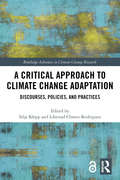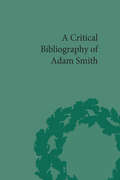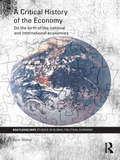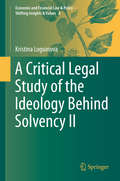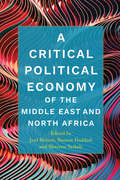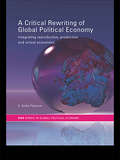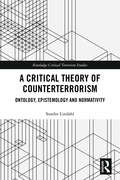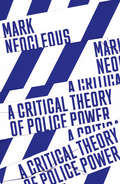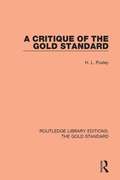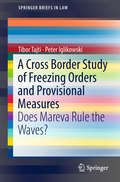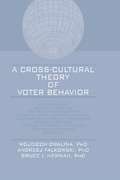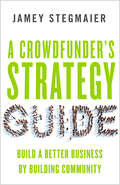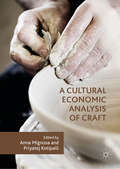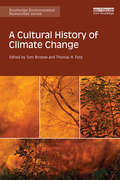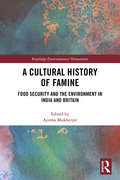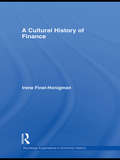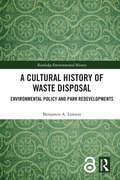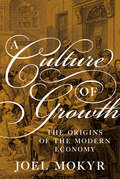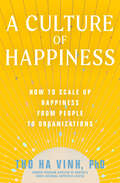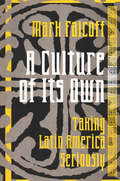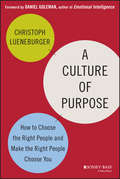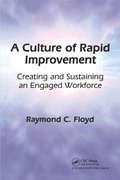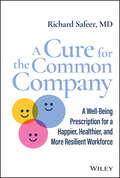- Table View
- List View
A Critical Approach to Climate Change Adaptation: Discourses, Policies and Practices (Routledge Advances in Climate Change Research)
by Silja Klepp Libertad Chavez-RodriguezThis edited volume brings together critical research on climate change adaptation discourses, policies, and practices from a multi-disciplinary perspective. Drawing on examples from countries including Colombia, Mexico, Canada, Germany, Russia, Tanzania, Indonesia, and the Pacific Islands, the chapters describe how adaptation measures are interpreted, transformed, and implemented at grassroots level and how these measures are changing or interfering with power relations, legal pluralismm and local (ecological) knowledge. As a whole, the book challenges established perspectives of climate change adaptation by taking into account issues of cultural diversity, environmental justicem and human rights, as well as feminist or intersectional approaches. This innovative approach allows for analyses of the new configurations of knowledge and power that are evolving in the name of climate change adaptation. This volume will be of great interest to students and scholars of climate change, environmental law and policy, and environmental sociology, and to policymakers and practitioners working in the field of climate change adaptation.
A Critical Bibliography of Adam Smith
by Hiroshi MizutaThis critical bibliography of Adam Smith takes as its starting point the Kress Library of Business and Economics’ 1939 catalogue of its Vanderblue Collection of Smithiana. Since the bicentenary of The Wealth of Nations in 1976, the rate of international publication markedly accelerated, significantly extending the scope of this bibliography beyond 1939. Its scope has been further enlarged via the inclusion of essays on the diffusion process while the inclusion of all works in the chronological main bibliography gives an overview of the scope of this process. The notes appended to the entries provide a running commentary to the gathering pace of publication and the entries are organised chronologically with systematic annotation throughout.
A Critical History of the Economy: On the birth of the national and international economies (RIPE Series in Global Political Economy)
by Ryan WalterDrawing on recent debates in critical International Political Economy, this book mobilizes the idea that the economy does not exist separately from society and politics to develop a detailed intellectual history of how the economy came to be seen as an independent domain. In contrast to typical approaches to writing the history of economic thought, which assume the reality of the economy, the author describes the forms of intellectual argument that made it possible to conceive of the national and international economies as objects of intellectual inquiry. At the centre of this process was the analytical separation of power and wealth. Walter thus offers a broad historical perspective on the emergence of current IPE theory, while linking the field with contextualist intellectual history. This important and innovative volume will be of strong interest to students and scholars of International Political Economy, International Relations, Economics, History and Political Theory.
A Critical Legal Study of the Ideology Behind Solvency II (Economic and Financial Law & Policy – Shifting Insights & Values #4)
by Kristina LoguinovaThis book analyzes the impact of Solvency II. In recent years, EU legislators have sought to introduce fundamental reforms. Whether these reforms were indeed fundamental is critically investigated with regard to a post-crisis piece of financial legislation affecting the EU’s largest institutional investors: Solvency II. Namely, the last financial and economic crisis, the worst financial catastrophe of the last decade, revealed that financial law in particular was not sufficiently mature to maintain the existence of a robust and trust-worthy financial system that could protect society from economic decline. The work also makes concrete recommendations on achieving a more sustainable future. As such, it offers a valuable resource for anyone who is interested in the financial system, the EU political economy, insurance, sustainability, and Critical Legal Studies.
A Critical Political Economy of the Middle East and North Africa (Stanford Studies in Middle Eastern and Islamic Societies and Cultures)
by Joel Beinin, Bassam Haddad, and Sherene SeikalyThis book offers the first critical engagement with the political economy of the Middle East and North Africa. Challenging conventional wisdom on the origins and contemporary dynamics of capitalism in the region, these cutting-edge essays demonstrate how critical political economy can illuminate both historical and contemporary dynamics of the region and contribute to wider political economy debates from the vantage point of the Middle East. Leading scholars, representing several disciplines, contribute both thematic and country-specific analyses. Their writings critically examine major issues in political economy—notably, the mutual constitution of states, markets, and classes; the co-constitution of class, race, gender, and other forms of identity; varying modes of capital accumulation and the legal, political, and cultural forms of their regulation; relations among local, national, and global forms of capital, class, and culture; technopolitics; the role of war in the constitution of states and classes; and practices and cultures of domination and resistance. Visit politicaleconomyproject.org for additional media and learning resources.
A Critical Rewriting of Global Political Economy: Integrating Reproductive, Productive and Virtual Economies (RIPE Series in Global Political Economy)
by V. Spike PetersonMoving beyond a narrow definition of economics, this pioneering book advances our knowledge of global political economy and how we might critically respond to it.V. Spike Peterson clearly shows how two key features of the global economy increasingly determine everyday lives worldwide. The first is explosive growth in financial markets that shape business decision-making and public policy-making, and the second is dramatic growth in informal and flexible work arrangements that shape income-generation and family wellbeing. These developments, though widely recognized, are rarely analyzed as inextricable and interacting dimensions of globalization. Using a new theoretical model, Peterson demonstrates the interdependence of reproductive, productive and virtual economies and analyzes inequalities of race, gender, class and nation as structural features of neoliberal globalization. Presenting a methodologically plural, cross-disciplinary and well-documented account of globalization, the author integrates marginalized and disparate features of globalization to provide an accessible narrative from a postcolonial feminist vantage point.
A Critical Theory of Counterterrorism: Ontology, Epistemology and Normativity (Routledge Critical Terrorism Studies)
by Sondre LindahlThis book offers a theory and model of counterterrorism based on emancipation and non-violence. Critical Terrorism Studies (CTS) scholars have produced wide-ranging and rich critiques of terrorism-related research, as well as state counterterrorism policies and practices. This work aims to fill in a gap in the current literature by constructing an original and specifically CTS model of counterterrorism. The model outlines the basic assumptions, priorities, principles, strategies and tactics, measures and evaluation of counterterrorism. It challenges prevalent models of counterterrorism through a radical rethinking of the ontology, epistemology and the agenda of counterterrorism. The model aims to prevent future acts of terrorism by (1) re-conceptualising how we study and understand terrorism, and; (2) suggesting that our efforts to counter and prevent terrorism must commensurate with the goals we want to achieve. Essentially, this involves a commitment to emancipation, and a rejection of violence as a tool. The second part of the book is a case study of Norwegian counterterrorism which shows how the theory and model developed in the book can be used. This is the first substantial analysis of Norwegian counterterrorism in almost ten years, and produces encouraging findings which support the potential for non-violent solutions to terrorism. This book will be of particular interest to students of terrorism and counterterrorism, critical security studies, and international relations in general.
A Critical Theory of Police Power: The Fabrication of the Social Order
by Mark NeocleousPutting police power into the centre of the picture of capitalismThe ubiquitous nature and political attraction of the concept of order has to be understood in conjunction with the idea of police. Since its first publication, this book has been one of the most powerful and wide-ranging critiques of the police power. Neocleous argues for an expanded concept of police, able to account for the range of institutions through which policing takes place. These institutions are concerned not just with the maintenance and reproduction of order, but with its very fabrication, especially the fabrication of a social order founded on wage labour. By situating the police power in relation to both capital and the state and at the heart of the politics of security, the book opens up into an understanding of the ways in which the state administers civil society and fabricates order through law and the ideology of crime. The discretionary violence of the police on the street is thereby connected to the wider administrative powers of the state, and the thud of the truncheon to the dull compulsion of economic relations.
A Critique of the Gold Standard (Routledge Library Editions: The Gold Standard #5)
by H. L. PuxleyOriginally published in 1933 this book discusses the inadequacy of ‘orthodox Gold Standard theory’ in the light of post-war monetary phenomena. In demonstrating that the Gold Standard had broken down the book explains that the Quantity Theory of Money is an inaccurate explanation of what happens over short periods and that the determining factor in the rise or fall of prices is the Velocity of Circulation. The book makes a plea for a workable Gold Standard operated by an international consortium of Central Banks.
A Cross Border Study of Freezing Orders and Provisional Measures: Does Mareva Rule the Waves? (SpringerBriefs in Law)
by Tibor Tajti Peter IglikowskiThis book compares the law on provisional measures of common law and civil law countries, the goal being to identify and compare their main advantages and disadvantages. The guiding concept is a well-known statement by the Justices of the US Supreme Court expressed in the famous Grupo Mexicano case, according to which the “age of slow-moving capital and comparatively immobile wealth” has now passed, and the 21st century requires a fresh look at the law of provisional measures. In the quest to find a model for interim relief, the Mareva Injunction, subsequently renamed the ‘Freezing Order’ in the English Civil Procedural Rules, is used as the benchmark to which each of the targeted systems discussed here is compared. This is because international scholarship, as well as e.g. the US Supreme Court, generally consider the Mareva Injunction to be the most effective and farthest-reaching provisional remedy. The analysis suggests that the Mareva Injunction / Freezing Order represents the type of relief that will most likely continue to dominate as the most efficient and farthest-reaching interim measure in the years to come.
A Cross-Border-Only Regulation for Consumer Transactions in the EU: A Fresh Approach to EU Consumer Law (SpringerBriefs in Business)
by Christian Twigg-FlesnerFor almost three decades, the European Union (EU) has adopted measures to regulate consumer transactions within the internal market created by the EU Treaties. Existing legislation is largely based on directives harmonizing aspects of national consumer laws. This Brief argues that a more appropriate approach for EU consumer law would be legislation in the form of a regulation which is applicable to cross-border transactions only. The author considers the constitutional constraints of the EU Treaties, before examining the case for a cross-border-only measure. He argues that the cross-border approach is preferable, because it would provide clearer benefits for consumers seeking to buy goods and services across borders, while not upsetting domestic law unnecessarily--in particular in the context of e-commerce, with implications for industry, policymaking, and regional development. The Brief concludes by suggesting that a successful EU measure on cross-border consumer transactions could create a template for global initiatives for transnational consumer law.
A Cross-Cultural Theory of Voter Behavior
by Bruce I Newman Wojciech Cwalina Andrzej FalkowskiThe rapid development of democracy and political freedoms has created new and sophisticated psychology-based methods of influencing the way voters choose, as well as political systems based on free market principles. A Cross-Cultural Theory of Voter Behavior uses advanced empirical testing to determine whether the behavior of voters in established and emerging democracies around the world is predictable. The results of the testing suggest the theory is a ground-breaking cross-cultural model with theoretical and strategic global implications. This unique book examines the many facets of political marketing and its direct relationship with the voter. A comprehensive theory meticulously tested in the dynamic political waters of the U.S. and Europe, this text bridges the latest theoretical developments in the emerging and advanced democracies. A Cross-Cultural Theory of Voter Behavior offers an innovative and seldom seen international perspective that integrates up-to-date literature in political science with advanced political marketing to provide readers with useable, unified information. In addition, the text is replete with detailed references and illustrated with a wealth of informative tables and graphics to made pertinent data accessible and easily understood. Some of the topics discussed in A Cross-Cultural Theory of Voter Behavior include politics in an age of manufactured images, partisanship and party identification, candidate-centered politics, political cognition, social categorization of politicians, the role of advertising and emotion, among others. An ideal text for students, academics, and researchers, the information presented in A Cross-Cultural Theory of Voter Behavior is also a vital resource for political practitioners such as consultants, candidates, lobbyists, political action committees, fund-raisers, pollsters, government officials, ad specialists, journalists, public relations executives, and congressional aides.
A Crowdfunder's Strategy Guide: Build a Better Business by Building Community
by Jamey StegmaierMore Than MoneyJamey Stegmaier knows crowdfunding. He's a veteran of seven successful Kickstarter campaigns (and counting) that have raised over $3.2 million, and he's the proprietor of the widely read Kickstarter Lessons blog. In this book he offers a comprehensive guide to crowdfunding, demonstrating that it can be a powerful way for entrepreneurs to grow their businesses by building community and putting their customers first.This book includes over forty stories of inspiring successes and sobering disasters. Stegmaier uses these examples to demonstrate how to (and how not to) prepare for a campaign, grow a fan base, structure a pitch, find new backers, and execute many other crucially important "nuts and bolts" elements of a successful crowdfunding project.But Stegmaier emphasizes that the benefits of crowdfunding are much more about the "crowd" than the "funding." He shows that if you treat your backers as people, not pocketbooks—communicate regularly and transparently with them, ask their opinions, attend to their needs—they'll become advocates as well as funders, exponentially increasing your project's chances of succeeding.
A Cultural Economic Analysis of Craft
by Anna Mignosa Priyatej KotipalliAre we aware of the values of craft? In this edited volume, cultural economists, researchers and professionals provide an interdisciplinary discussion of the relevance and contribution of the craft sector to the economy, as well as to society at large. Mignosa and Kotipalli bring together contributors to compare the craft sector across countries, analysing the role of institutions, educational bodies, organisations and market structure in its evolution and perception. The Western approach to craft and its subordinate position to the arts is contrasted with the prestige of craftmanship in Eastern countries, while the differing ways that craft has attracted the attention of policy agencies, museums, designers and private institutions across regions is also analysed. This volume is vital reading to those interested in the economic features of craft and craftsmanship around the world, as well as for those interested in the importance of policy in bringing about effective sustainable development.
A Cultural History of Climate Change (Routledge Environmental Humanities)
by Tom Bristow Thomas H. FordCharting innovative directions in the environmental humanities, this book examines the cultural history of climate change under three broad headings: history, writing and politics. Climate change compels us to rethink many of our traditional means of historical understanding, and demands new ways of relating human knowledge, action and representations to the dimensions of geological and evolutionary time. To address these challenges, this book positions our present moment of climatic knowledge within much longer histories of climatic experience. Only in light of these histories, it argues, can we properly understand what climate means today across an array of discursive domains, from politics, literature and law to neighbourly conversation. Its chapters identify turning-points and experiments in the construction of climates and of atmospheres of sensation. They examine how contemporary ecological thought has repoliticised the representation of nature and detail vital aspects of the history and prehistory of our climatic modernity. This ground-breaking text will be of great interest to researchers and postgraduate students in environmental history, environmental governance, history of ideas and science, literature and eco-criticism, political theory, cultural theory, as well as all general readers interested in climate change.
A Cultural History of Famine: Food Security and the Environment in India and Britain (Routledge Environmental Humanities)
by Ayesha MukherjeeThe term "food security" does not immediately signal research done in humanities disciplines. It refers to a complex, contested issue, whose currency and significance are hardly debatable given present concerns about environmental change, resource management, and sustainability. The subject is thus largely studied within science and social science disciplines in current or very recent historical contexts. This book brings together perspectives on food security and related environmental concerns from experts in the disciplines of literary studies, history, science, and social sciences. It allows readers to compare past and contemporary attitudes towards the issues in India and Britain – the economic, social, and environmental histories of these two nations have been closely connected ever since British travellers began to visit India in the latter half of the sixteenth century. The chapters in this book discuss themes such as climate, harvest failure, trade, technological improvements, transport networks, charity measures, and popular protest, which affected food security in both countries from the seventeenth century onwards. The authors cover a range of disciplinary and interdisciplinary approaches, and their chapters allow readers to understand and compare different methodologies as well as different contexts of time and place relevant to the topic. This book will be of great interest to students and researchers of economic and social history, environmental history, literary studies, and South Asian studies.
A Cultural History of Finance (Routledge Explorations In Economic History Ser.)
by Irene Finel-HonigmanThe world of finance is again undergoing crisis and transformation. This book provides a new perspective on finance through the prism of popular and formal culture and examines fascination and repulsion toward money, the role of governments and individuals in financial crises and how the Crisis of 2008, like others since 1720, repeat the same patterns of enthusiasm, greed, culpability, revulsion, reform and recovery. The book explores the political and socio-economic factors which determine fallibility and resilience in financial cultures, periods of crisis, transition and recovery based on cyclical rather than linear progression. Examining the roots of financial capitalism, in Europe and the United States and its corollary development in Asia, Russia and emerging markets proves that cultural and psychosocial reactions to financial success, endeavor and calamity transcend specific periods or events. The book allows the reader to discover parallel and intersecting reactions, controversies and resolutions in the cultural history of financial markets and institutions.
A Cultural History of Waste Disposal: Environmental Policy and Park Redevelopments (Routledge Environmental History)
by Benjamin A. LawsonThis book offers a historical analysis of landfill sites in New York City, Greater Toronto, and Greater Tel Aviv, and uses them as case studies to emphasize the international and global scale of issues concerning waste disposal and park redevelopments.New York, Toronto, and Tel Aviv are currently redeveloping giant landfills into parks to much fanfare. The park redevelopments may be seen as an attempt to erase or assuage the decades of problematic waste-disposal policy that led to the creation of such large landfills. Booster rhetoric underscores this point, such as promoting how the parks will be a “green lung” for the city. This book contextualizes these redevelopments by offering a historical analysis, providing a greater understanding of the past, current, and future potential issues. It goes on to analyze the language and media coverage surrounding former waste sites becoming park redevelopments, including how cities use art to promote their image and gain cultural relevance. By engaging with both the works of waste historians and literature on waste and discard studies, the book provides theoretical models for analyzing the role of power in municipal systems, as well as human and ecological impacts on waste. It concludes with an analysis of the features necessary for landfill parks to be successful. This book will be useful for scholars, researchers, and academics studying waste studies, the environment, cities, and sustainable development, as well as for policymakers and environmental/eco artists.
A Cultural Transformation at Southeastern Grocers
by Suraj Srinivasan Jonah S. Goldberg Joseph A. PaulCase
A Culture of Growth: The Origins of the Modern Economy
by Joel MokyrDuring the late eighteenth century, innovations in Europe triggered the Industrial Revolution and the sustained economic progress that spread across the globe. While much has been made of the details of the Industrial Revolution, what remains a mystery is why it took place at all. Why did this revolution begin in the West and not elsewhere, and why did it continue, leading to today's unprecedented prosperity? In this groundbreaking book, celebrated economic historian Joel Mokyr argues that a culture of growth specific to early modern Europe and the European Enlightenment laid the foundations for the scientific advances and pioneering inventions that would instigate explosive technological and economic development. Bringing together economics, the history of science and technology, and models of cultural evolution, Mokyr demonstrates that culture--the beliefs, values, and preferences in society that are capable of changing behavior--was a deciding factor in societal transformations. Mokyr looks at the period 1500-1700 to show that a politically fragmented Europe fostered a competitive "market for ideas" and a willingness to investigate the secrets of nature. At the same time, a transnational community of brilliant thinkers known as the "Republic of Letters" freely circulated and distributed ideas and writings. This political fragmentation and the supportive intellectual environment explain how the Industrial Revolution happened in Europe but not China, despite similar levels of technology and intellectual activity. In Europe, heterodox and creative thinkers could find sanctuary in other countries and spread their thinking across borders. In contrast, China's version of the Enlightenment remained controlled by the ruling elite.Combining ideas from economics and cultural evolution, A Culture of Growth provides startling reasons for why the foundations of our modern economy were laid in the mere two centuries between Columbus and Newton.
A Culture of Happiness: How to Scale Up Happiness from People to Organizations
by Tho Ha VinhPractical principles for creating conditions for happiness at scale from the program director of the Gross National Happiness Center of Bhutan, the only country in the world to measure progress by the happiness of its citizens.Despite countless happiness programs focused on individual well-being, are we any happier, really? Is it in fact possible to be fully happy within a miserably dysfunctional society built to keep structures of inequity in place? Possible, perhaps, but not easy. While the pursuit of happiness is a much-celebrated ideal, how can countries and communities design the right environments for people to lead happy lives? Personal programs for happiness that include mindfulness, empathy, and gratitude are a good start, but without structural changes, they can only go so far. Taking the case of the country of Bhutan as an example, the nation's first Gross National Happiness program director Tho Ha Vinh explains how the principles of happiness can and must apply to people, families, and communities at scale to produce the conditions for a truly satisfying life. More and more people feel that we live in a time of transition and that our very survival on this planet depends on renewing the way we live together in society. Gross National Happiness is an innovative development paradigm that puts the interconnected happiness of all people and the well-being of all life forms at the center of progress. Based on real-life experiences, this book shows a multitude of practical methods for strategic thinkers and change makers to apply the framework of Gross National Happiness to bring about positive change in schools, businesses, and communities.
A Culture of Its Own: Taking Latin America Seriously
by Mark FalcoffA Culture of Its Own: Taking Latin America Seriously presents Mark Falcoff's essays on the region. Many of them are contentious; none of them are dull. He ranges from bilingualism to the cult of Garcia Lorca, from U.S.-Cuban relations to Chile's curious love affair with Germany. On more than one occasion, Falcoff takes aim at American journalism and scholarship, both of which, he argues, have all too often produced a fantasy version of Latin America which reflects our own national narcissism rather than genuine curiosity about the other. Latin America, Falcoff argues, is not merely a geographical extension of the United States, or a kind of downmarket version of the American Southwest. It is a culture all its own, with its own historical memory, sensibility, and worldview. Its achievements -and its miseries-are also its own, not the end-product of policies made by the Pentagon, Wall Street, or the CIA.Falcoff writes about the region with originality, iconoclastic wit, and distinctive literary flair. His volume will interest Latin American specialists, diplomats, and journalists as well as those general readers who think they are not interested in Latin America-or who only suspect they might be, but don't know quite where to start.
A Culture of Purpose
by Christoph LueneburgerHow innovative leaders create meaningful cultures that attract and retain top talentBuilding a culture of purpose is one of the greatest challenges facing modern leaders, as today's best minds are looking for meaning, not just jobs. More than any other single factor, cultures of purpose power winning organizations, attracting the smartest, most creative, most passionate talent.For leaders building cultures of purpose, the commercial pursuit of sustainability provides the most reliable blueprint. While sustainability has been commonly misconstrued as a description of a set of problems, Christoph Lueneburger shows that it is really a solution to problems, capable of inspiring people and forging cultures.Sharing his exclusive, in-depth dialogues with chief sustainability officers, CEOs, and board chairmen, Lueneburger reveals how sustainability works at places where it works best, including Chrysler, Unilever, TNT, Walmart, and Bloomberg. Featuring a clear three-phase process that helps leaders assess the talent needed to develop organizations characterized by energy, resilience, and openness, A Culture of Purpose offers leaders the right questions to ask in order to:Tap and Nurture Your Current Corporate Strengths: Learn how to recognize, cultivate, and leverage the competencies of your current talent to develop your leadership team.Hire the Right Team: Ask the right questions to identify the innate personality traits in potential new hires, regardless of level and function, to bring on board those most likely to succeed in and shape your organization.Craft Your Culture: Create an environment that unleashes these competencies and traits and pushes them to the fore. Shape how people relate to one another and collectively go for what would be out of reach to them individually.Many books have described the "what" and the "how" of sustainability, but this is the first to reveal the "who." Lueneburger changes dated preconceptions to show that sustainability is not an ideological mindset but a cultural trait of a resilient business. For leaders ready to build and strengthen a winning business, A Culture of Purpose is an education, a revelation, and an invitation to the next generation of success.
A Culture of Rapid Improvement: Creating and Sustaining an Engaged Workforce
by Raymond C. FloydBecome a corporate change agent Learn to implement and cultivate a culture of improvement with the assistance of one of the world’s most respected experts Managing a business so that it achieves a supreme pace of improvement requires that all members of an organization can and do make their best contributions to the success of the enterprise. Management must provide employees with a shared set of values and beliefs so that they can decide for themselves how to behave in accordance with the expectations of a nurturing and empowering culture. A Culture of Rapid Improvement is intended for those leaders seeking to encourage dramatic improvement within their organizations. It shows these change agents how they can— · Develop the shared values and beliefs that serve as the foundation for a dynamic culture · Engage all employees to join the new culture and provide opportunities for these stakeholders to initiate and participate in improvement · Measure, evaluate, and manage the performance of the new culture Filled with lessons garnered from practical examples, this text is based on Raymond C. Floyd's 40 years of industrial management experience, including his more than 20 years at Exxon Mobil. He is the winner of a Shingo Prize and also holds the unique distinction of having led businesses from two different industries that were both recognized by IndustryWeek magazine as being among the Best Plants in America. If you approach the task of improvement with proper action and full participation, improvement is not just possible, but inevitable. At six months, you will notice a difference in your organizational culture; at the end of two years, you will be operating with near–world-class performance.
A Cure for the Common Company: A Well-Being Prescription for a Happier, Healthier, and More Resilient Workforce
by Richard SafeerMake your workforce happier, healthier—and more productive—with strategies from a world-leader in company culture and health In A Cure for the Common Company: A Well-Being Prescription for a Happier, Healthier, and More Resilient Organization, health and well-being expert, Richard Safeer, M.D. delivers a step-by-step roadmap to creating a culture of health on your team and in your company that keeps your people happier and more engaged. In the book, you’ll discover the importance of shaping your well-being culture, challenging yourself, your team, and your workforce to live better lives by offering them new tools and methods to do just that. This book discusses: Bulletproof strategies to help leaders build a sound cultural foundation that supports their efforts at change A path forward that allows organizational leaders to step up and help their employees be the best versions of themselves Techniques to build a supportive culture that overcomes common obstacles to change, including positive social climates, norms, and peer supports A can't-miss resource for business and human resource leaders at medium- to large-sized organizations, A Cure for the Common Company also belongs on the bookshelves of every professional interested in supporting employee health and well-being.
